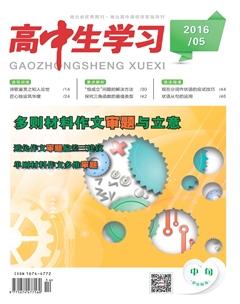有问必答
张耀东
问
“no matter+疑问词”或“疑问词+后缀ever”如何运用?
答 No matter what happened, he would not mind.
Whatever happened, he would not mind.
替换:no matter what=whatever
no matter who=whoever
no matter when=whenever
no matter where=wherever
no matter which=whichever
no matter how=however
注意:no matter不能引导主语从句和宾语从句。
No matter what you say is of no use now. (×)
Whatever you say is of no use now. ()
你现在说什么也没用了。(whatever you say是主语从句)
Prisoners have to eat no matter what theyre given. (×)
Prisoners have to eat whatever theyre given. ()
囚犯们只能给什么吃什么。
until和till有哪些区别?
答 此两个连词意义相同。肯定形式表示的意思是“做某事直至某时”,动词必须是延续性的。否定形式表达的意思是“直至某时才做某事”。动词为延续性或非延续性都可以。正确使用这两个连词的关键之一就在于判断句中的动词该用肯定式还是否定式。
肯定句:
I slept until midnight. 我一直睡到半夜时醒了。
Wait till I call you. 等着我叫你。
(在肯定句中可用before代替:Lets get in the wheat before the sun sets.)
否定句:
She didnt arrive until 6 oclock.
她直到6点才到。
Dont get off the bus until it has stopped.
公共汽车停稳后再下车。
I didnt manage to do it until you had explained how.
直到你教我后,我才会做。
(1)until可用于句首,而till通常不用于句首。
Until you told me, I had heard nothing of what happened.
直到你告诉我以前,出了什么事我一点也不知道。
(2)until when疑问句中,until要放在句首。
—Until when are you staying?
你待到什么时候?
—Until next Monday.
待到下周一。
注意:否定句可用另外两种句式表示。
(3)not until ... 在句首,主句用倒装。
Not until the early years of the 19th century did man know what heat is.
直到19世纪初,人类才知道热能是什么。
Not until I began to work did I realize how much time I had wasted.
直到我开始工作,我才认识到了我已蹉跎了多少岁月。
问:只能用that作为定语从句的关系代词?
答 1. 在there be句型中,只用that,不用which。
2. 在不定代词,如:anything,nothing,the one,all等作先行词时,只用that,不用which。
3. 先行词有the only,the very,the same,the last,just修饰时,只用that。
4. 先行词为序数词、数词、形容词最高级时,只用that,不能用which。
5. 先行词既有人,又有物时。
6. 先行词指物,在主句中作表语时。
7. 为了避免重复。
8. 先行词是the way或the reason时,that可作关系副词,也可省略。
9. 主句的主语是疑问词who/which时。
Is this the book that you borrowed in the library?
这是你在图书馆借的那本书吗?
Who that break the window should be punished.
谁打碎了窗户都要受到惩罚。
All that is needed is a supply of oil.
所需的只是供油问题。
Finally, the thief handed everything that he had stolen to the police.
那贼最终把偷的全部东西交给了警察。
问如何区分定语从句和同位语从句?
答 1. 定语从句修饰先行词,它和先行词是修饰关系;同位语从句说明先行词的具体内容,是补充说明的关系。
The plane that has just taken off is for London.(定语从句)
The fact that he has been dead is clear. (同位语从句)
2. 定语从句由关系代词或者关系副词引导,关系词在句中充当成分,有时可以省略;同位语从句主要由that引导,在句中一般不做成分;句子也可以由when,where,how,why,whether,what等词引导,充当成分。
The news he told me is true.
The news that he has just died is true.
The problem that we are facing now is how we can collect so much money. (定语)
The problem how we can collect so much money is difficult to solve.
3. 同位语从句和先行词一般可以用be动词发展成一个完整的句子,而定语从句不可以发展成一个完整的句子。
The idea that we could ask the teacher for advice is wonderful. (同位语)
The idea was that we could ask the teacher for advice.
The fact that the moon moves around the earth is known to all.
The fact is that the earth moves around the earth.
问关系代词as和which引导的定语从句as和which引导非限制性定语从句,有哪些相同之处和不同之处?
答 1. As和which都可以在定语从句中做主语或者宾语,代表前面整个句子。
He married her, as/which was natural.
He was honest, as/which we can see.
2. as引导非限制性定语从句,可放在主句之前,或者主句之后,甚至可以切割一个主句;which引导的非限制性定语从句只能放在主句之后。另外,as有“正如……,正像……”的意思。
John, as you know, is a famous writer.
As is known to all, China is a developing country.
He is from the south, as we can see from his accent.
He has been to Paris more than several times, which I dont believe.
注意:当主句和从句存在逻辑上的因果关系时,常用which。
Tom was always late for school, which made his teacher angry.
3. 当先行词受such, the same修饰时,常用as。
He is not such a fool as he looks.
I have never heard such a story as he tells.
This is the same book as I lost last week.
注意:当先行词由the same修饰时,偶尔也用that引导定语从句,但是和由as所引导的定语从句意思不同。
She wore the same dress that she wore at Marys wedding.
她穿着她在玛丽婚礼上穿过的一条裙子。
She wore the same dress as her young sister wore.
她穿着和她妹妹所穿的一样的裙子。
注意:定语从句such ... as ... 与结果状语从句such ... that ... 的区别:as在所引导的定语从句中作主语,宾语;that在结果状语从句中不做成分。
He has such a good laptop as I want to buy.
He has such a good laptop that I want to buy one.
问关系代词as与which有哪些句法功能?
答 1. as/which 在特殊定语从句中作主语。
as作主语时,谓语动词常为连系动词(主要是be, seem),主语补语为usual、a rule、a matter of fact等时,系动词be习惯经常省略。行为动词作as特殊定语从句的谓语时一般用于被动语态(其中助动词be常略),不及物的行为动词在as特殊定语从句中作谓语的极少,常见的有happen一词。如:
Freddie,as might be expected,was attending the conference.
which作主语时,谓语动词不限,主动、被动皆可,只是谓语动词为被动语态时助动词be省略。
2. as和which都可以在特殊定语从句中宾语。
3. as和 which在特殊定语从句中作补语。如:
We thought him a gentleman,as/which he could never be.
as特殊定语从句中可以主谓倒装,which从句中则不能主谓倒装。
如果先行成分不是主语补语或宾语补语,关系代词用which而不用as。如:
He talked like a native,which/as he hardly was.
4. which在特殊定语从句中作定语。
which可以在特殊定语从句中作定语,修饰fact,matter,thing等名词。这些名词代表先行成分表达的意义,有时将其略去句义仍然完整。as不能作定语。如:
I was told to go not by train but bus, which advice I followed.

